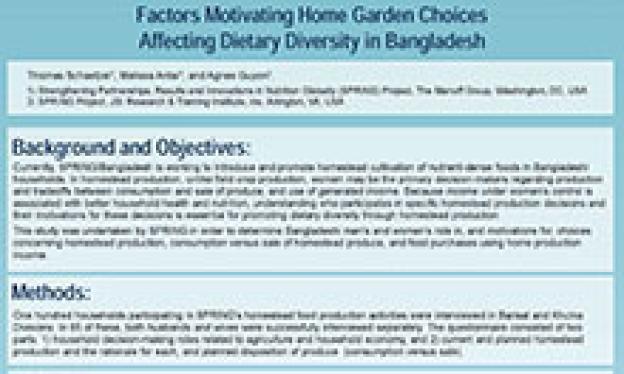Authors: Schaetzel T; Antal M; Guyon A
Background and objectives: Currently, SPRING/Bangladesh is working to introduce and promote homestead cultivation of nutrient-dense foods in Bangladeshi households. In homestead production, unlike field crop production, women may be the primary decision-makers regarding production and tradeoffs between consumption and sale of produce, and use of generated income. Because income under women’s control is associated with better household health and nutrition, understanding who participates in specific homestead production decisions and their motivations for these decisions is essential for promoting dietary diversity through homestead production.
This study was undertaken by SPRING in order to determine Bangladeshi men’s and women’s role in, and motivations for, choices concerning homestead production, consumption versus sale of homestead produce, and food purchases using home production income.
Methods: One hundred households participating in SPRING’s homestead food production activities were interviewed in Barisal and Khulna Divisions. In 65 of these, both husbands and wives were successfully interviewed separately. The questionnaire consisted of two parts: 1) household decision-making roles related to agriculture and household economy, and 2) current and planned homestead production and the rationale for each, and planned disposition of produce (consumption versus sale).
Results: Both men and women report that women are the primary decision-makers more often for home gardening or livestock production than for agricultural production, and are more often involved in decisions for these activities. A high degree of joint decision making was reported by men and women.
Comparing motivations within a household, the male-female differences become even more pronounced. For nearly all crops and livestock queried, instruction on how to grow it, free seed (also chicks or fingerlings), storage ability, and potential crop sale are far more important to wives than husbands. This is evidenced by differences in rating the importance of factors motivating production of bottlegourd. Conversely, ease of production, low production cost, and lack of risk are generally higher priorities for men.
Conclusions: The findings of this study suggest that women in Bangladesh value food production skills training as the single most important motivating factor for homestead production. For improved dietary diversity through homestead production, behavior change efforts should focus on skills development and access to seed among women, while reassuring husbands that home production carries low risk, requires little expense, and calls for minimal labor.
